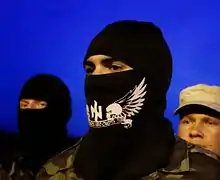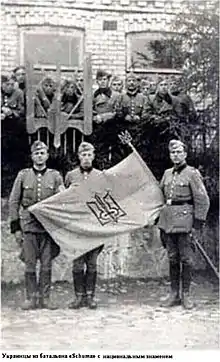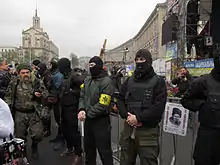Far-right politics in Ukraine
Far-right politics in Ukraine refers to the actions, organizations, and beliefs of the far-right in Ukraine. In the recent years it has been closely related to an increased level of extreme far-right ideology promoting neo-nazism, white supremacy, antisemitism and xenophobia in Ukraine.[1] There is a growing body of evidence of civil freedom violations, bans on books, violence of far-right extremists, ultranationalism, neo-Nazi pogroms of ethnic communities such as Roma people, attacks on feminists and LGBT minorities, and officially sponsored glorification of Nazi collaborators.[2]

Some sources note that confrontations between the right-wing extremists and law enforcement officers demonstrate an unexplained passivity of the Ukrainian police when it comes to preventing, suppressing or investigating the illegal actions.[3]
In the same time many reports emphasize that the violent picture of the Ukrainian nationalism is coming out of Western mainstream media, whistleblowers and Jewish organizations, for example Radio Free Europe, World Jewish Congress, Simon Wiesenthal Center, Amnesty International, Human Rights Watch, and Freedom House.[2]
In the 2019 Ukrainian parliamentary election all major Ukrainian right-wing parties formed a nationwide united party list with the political parties Svoboda, National Corps, the Governmental Initiative of Yarosh, and the Right Sector.[4] However, the resulting coalition only managed to win 2.15% of the popular vote, and since the coalition failed to pass the 5% threshold it gained no parliamentary seats.[5] No far-right parties gained seats in the Verkhovna Rada (Ukraine's parliament), as they all failed to win any single-mandate constituency seat.[5]
Social and economic background

Due to an ongoing economic crisis, a large part of the Ukrainian population is suffering from poverty, unemployment, and abnormally low wages for government and social workers. The situation is aggravated by widespread corruption, an often dysfunctional justice system, and high rates of alcoholism resulting in generally poor public health outcomes. All the factors together instigate a growing social anomie and prevailing distrust of the Ukrainian authorities and local administrations. Moreover, national attitudes about the far-right are impacted by the ambivalent role Ukraine played during Nazi occupation, with Ukrainians volunteering in SS troops and as concentration camp guards.[6] In addition to this, the official position of Ukrainian authorities tends to ignore war crimes committed by the Ukrainian nationalists, including extermination of its Polish population, massacres of Ukrainian civilians, and participation in anti-Jewish pogroms.[7]
As a result, right-wing ideology in Ukraine has strong currents of racism, xenophobia, anti-Semitism, authoritarianism, anti-parliamentarianism, and ethnonationalism. This abstract concept is often associated with a denial of the Holocaust and ignoring of genocidal politics of Adolf Hitler, Nazi Germany and National Socialism.[8] The translation of the philosophy into living reality finds its way to the public as a right-wing extremism, which threatens democratic development of the nation. In the same time the Ukrainian far-right extremists reject democratic values such as freedom of speech yet actively employ all spectrum of the opportunities offered by the democracy.[3]
According to a 2018 Freedom House report a gradual rapprochement is taking place between Ukrainian far-right organizations and the state authorities. Freedom House claims this trend is especially noticeable with regards to law enforcement agencies. The appointment of some political figures with notoriously far-right views such as Vadym Troyan and Andriy Biletsky to high level positions in the national police remains a matter of concern to Freedom House.[3]
In the 2019 Ukrainian parliamentary election all mayor Ukrainian right-wing parties formed a nationwide united party list with the political parties Svoboda, National Corps, the Governmental Initiative of Yarosh, and the Right Sector.[4] However, the resulting coalition only managed to win 2.15% of the popular vote, and since the coalition failed to pass the 5% threshold, no parliamentary seats.[5] All parties ultimately received no representation in the Verkhovna Rada (Ukraine's parliament), as they all failed to win any single-mandate constituency seat.[5]
Far right violence

Media coverage has been focused largely on Svoboda party whose members stand accused of killing four national guardsmen using hand grenades during a rally outside Ukrainian parliament in August 2015.[9] None of the accused were convicted leading to the NGO Freedom House claiming this as an example of "unacceptable passivity when it comes to preventing or suppressing unlawful activities, investigating incidents, and bringing perpetrators to justice" on behalf of police.[3]
Regular torchlight marches by members of the Ukrainian far-right have drawn comparisons to those in Germany after World War I and Ukrainian authorities have faced widespread criticism for their perceived inaction in the face of far-right crime. Repeated attempts by authorities to memorialize Ukrainian nationalist leaders who collaborated with Nazi Germany during World War II have also drawn criticism.[2][10]
Ukraine's hate crime rate until 2005 was not notably higher than other similar nations. Its growth seems to be caused by raise of informal youth groups, in particular skinheads who assaulted “non Slavic” people while using "Nazi slogans".[11] According to statistics collected on antisemitic vandalism these activities are on the rise, in the first three months of 2018 extremists tried to disrupt at least twelve different public events and attacked a variety of targets.[12] Reportedly, the Ukrainian justice system keeps to classifies right-wing terrorism as acts of hooliganism, including, for example, a 2009 failed bomb attack on a Jewish Center.[13]
Military units
According to American scientist Stephen F. Cohen in 2018 the resurrection of Nazi ideology could be observed all around the globe, including Europe and the United States. But he believes that the growing Ukrainian Neo-Nazi movement poses a special danger due to its well-armed and well-organized nature in a political center of the Second Cold War.[10] For example, a 2018 a picture of a Ukrainian soldier wearing Nazi symbolic SS Totenkopf who was standing right behind President Poroshenko.[1] Cohen also mentioned the Azov battalion as a manifestation of the resurgence of Ukrainian Neo-Nazism.[10]
British scholar Richard Sakwa pointed out that the Ukrainian National Guard units, manned by far right militants "often lacked discipline and treated south-east Ukraine as occupied territory, regularly committing atrocities against civilians and captured ‘terrorists’".[14] Freedom House has reported that some whistleblowers raised a public concern about an integration of Ukrainian Neo-Nazi into the Ukrainian law enforcement. They claim the process seems to be bolstered by the need to incorporate the uncontrolled military units of the Neo-Nazi volunteers into the national armed and security forces.[3]
Major Political parties and Groups
- Congress of Ukrainian Nationalists (1992-since)
- Svoboda (political party) (2004-since)
- Ukrainian National Union (political party) (2009-since)
- Right Sector (2013-since)
- National Corps (2016-since)
Defunct Political parties and Groups
- Social-National Party of Ukraine (1991-2004)
- Patriot of Ukraine (2005-2014)
- Social-National Assembly (2008-2015)
See also
Notes
- Michael Colborne Why Does No One Care That Neo-Nazis Are Gaining Power In Ukraine?, forward.com, 2018
- Lev Golinkin Neo-Nazis and the Far Right Are On the March in Ukraine, The Nation, February 2019
- Likhachev 2018, p. 5.
- (in Ukrainian) Yarosh, Tyagnibok and Biletsky have all formed a single list for the elections, Glavcom (9 June 2019)
- CEC counts 100 percent of vote in Ukraine's parliamentary elections, Ukrinform (26 July 2019)
(in Russian) Results of the extraordinary elections of the People's Deputies of Ukraine 2019, Ukrayinska Pravda (21 July 2019) - Kersten & Hankel 2013, p. 91, 92.
- Mierzejewski-Voznyak 2018, p. 875.
- Kersten & Hankel 2013, p. 86.
- Paul Funder Larsen Right-wing nationalists under investigation after last year’s sniper massacre in Kiev Jyllands-Posten, 2015
- Stephen F. Cohen America’s Collusion With Neo-Nazis. Neo-fascists play an important official or tolerated role in US-backed Ukraine The Nation, 2018
- Kersten & Hankel 2013, p. 93.
- Likhachev 2018, p. 4.
- Kersten & Hankel 2013, p. 93, 94.
- Sakwa 2015, p. 159,160.
References
- Kersten, Joachim; Hankel, Natalia (2013). "A comparative look at right-wing extremism, anti-Semitism, and xenophobic hate crimes in Poland, Ukraine, and Russia". Right-Wing Radicalism Today. ISBN 978-0-415-62723-8.
- Likhachev, Vyacheslav (2018). Far-right Extremism as a Threat to Ukrainian Democracy (PDF). Nations in Transit. Freedom House.
- Mierzejewski-Voznyak, Melanie (2018). "Nationalism (s) in a Structural-Historical Context". The Oxford Handbook of the Radical Right. New York: Oxford University Press. ISBN 978-0-19-027456-6.
- Sakwa, Richard (2015). "Peace and War". Frontline Ukraine. Crisis in Borderlands. London: I. B. Tauris. ISBN 978-0-85773-804-2.
